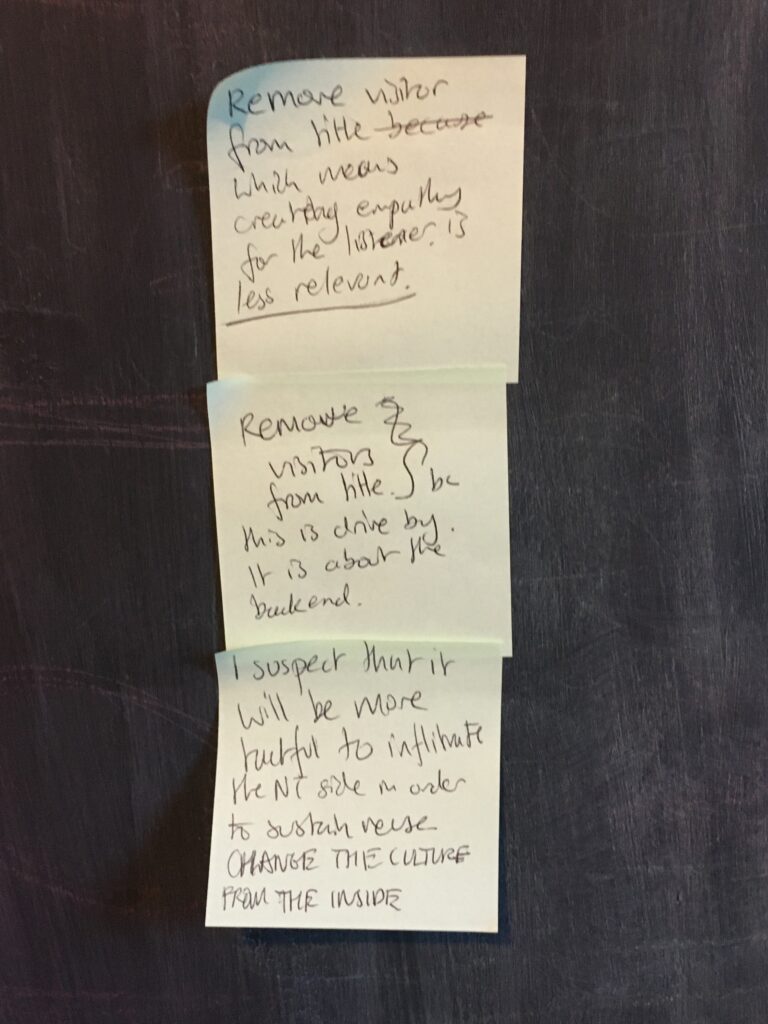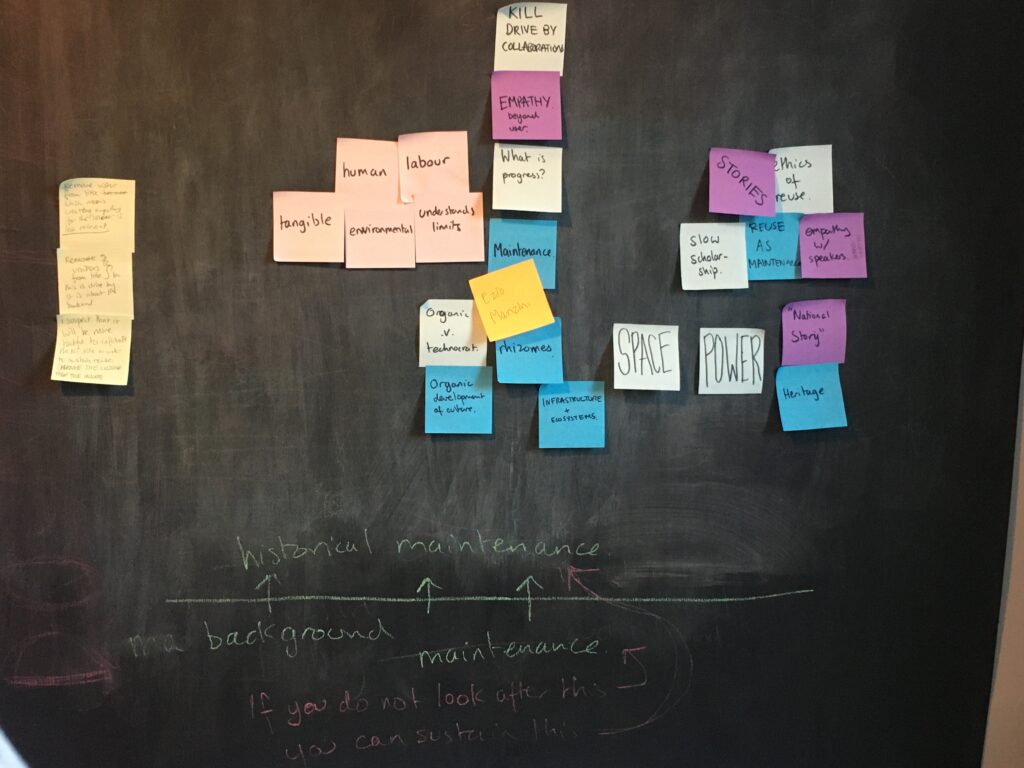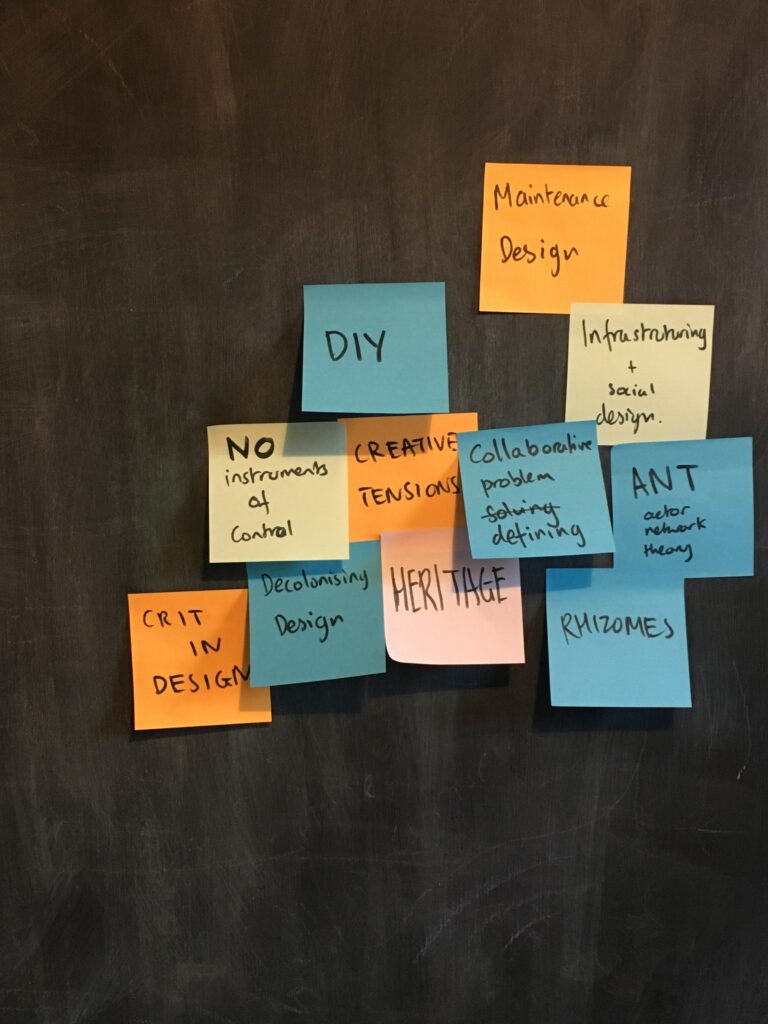Tag Archives: Power
OHD_BLG_0045 Leaching off Public History MA trips
Two thing I learnt while tagging along with the Public History MA trips to various heritages sites.
Chasing funding
We went to three different heritage sites of varying status and every single one of them mentioned funding many, many, many times. Like many things in the world money is the foundation of any project, endeavour, or system, without it nothing happens, even in the heritage sector where a considerable amount of the labour is free because of volunteers. The majority of funding is project based. That means you write a proposal for a project, which has target outcomes and needs to be completed in a set amount of time. Once the project is finished and you have used up all the funding you have to go look for another project and a new funding. This is often referred to as the funding cycle. The funding cycle is not necessarily good in supporting legacy long term projects. “What will happen when the funding runs out?” is constantly looming over any project and many people actually spend a lot of time writing funding bids instead of working on projects. I therefore not the greatest fan of the funding cycle but there was one person we talked to during the week that gave me a new perspective on the whole thing. They said that the funding cycle allowed them to constantly be reflecting on their practice and what they should be doing next. This is interesting to me because reflective practice has been taught to me as a new and innovative groovy thing. New systems keep on being developed in order to incorporate more reflection but in the funding cycle it has always existed, kind of… It is probably a lot easier to have this attitude when you know you are going to get the next funding anyway, which this person definitely did.
Democratisation of Space
The second thing I realised/changed my perspective on during these trips was how you can view a lot of the politics through the idea of “whose heritage is it anyway?” but somehow I realised that it might be helpful to view it within the context of space and ownership of space. This is quite common in art I guess as people often talk about who gets put in certain gallery spaces and who does not. Every group has their history which they can keep but where it is displayed is where the power truly lies. Sure you can have a history of black people in the black history archive but a far more powerful space to have the exhibition would be the British Library or National Gallery. My theory is: that when we talk about democratising heritage what we really are talking about is democratising space. How can we represent our multilayered history in our limited heritage space? I am thinking that the answer is probably something along the lines of nonpermanent exhibitions…
OHD_BLG_0048 The right to repair 🛠
The right to repair is important and connected to my work because like many things in the world it has to do with maintenance. I had a chat with O Hemstock from Northumbria University about slow design and he brought up that maintenance is about agency. It is about the right to repair and the power you have over the objects that make up your life. Having agency means that you can fix it when it is broken, you don’t need to rely on others to fix it for you and you are not forced to buy another. But it is also about the ability to customised and edit and make the object fit to your needs instead of the other way round. It is important to think about maintenance not only because of the planet but because of the effect objects have on people’s lives. For example you want a pan to be good but what if the person burns something in the pan, which they are likely to do because they are human. What do you as the producer of the pan do then? Sure technically the ownership of the pan has moved from one to another but what can you do to help the new owner with maintenance of the pan. Handy youtube videos on how to clean your pan or a cleaning service for example. Now I am aware that the pan scenerio is a bit of an odd one but thinking about maintenance is always a good thought exercise in design.
OHD_BLG_0063 A Spanner, a Chat and a Gang
Subheading: a meeting with Lucy Porten
Bad news first? Or good news first? Lets end on a positive…
The Spanner
So… The National Trust is not an archive. Every recording is stored at the British Library and you have to pay to get it out; a small fee but still. A fabulous perk of having it stored at the British Library is that the library is a power house and has the money and facilities to keep everything updated and playable. They also have great paperwork, which can be interpreted in multiple ways. The National Trust also does not use this archive. The National Trust podcasters have only recently discovered the existence of the archive, which is a bit awkward. Also it is unknown whether the British Library wants to store any edited recordings.
This does not mean that I am not allowed to keep copies of the recordings at the hall, but the British Library have pretty strict rules around keeping second copies. They are definitely a bigger stakeholder then I initial imagine, but I think we can still think of something.
Added note (27/04/21) Tried to find the National Trust archive on the British Library website and failed. Even asked the help chat and they could not help me.
The Chat
I mentioned that I was interested in doing an oral project around this oral history project, Lucy reacted by saying that she also was interested in doing an oral history project of oral history at the National Trust. The National Trust seems to be in a similar spot as the UN and the WTO where they have no idea how they got where they are now.
The Gang
Now this is the really fun bit because Lucy’s and my thinking do align, and my CDA is starting at a time of change within the National Trust and an increasing interest in oral history. Lucy therefore wants to set up an informal gang of like minded people and I have an invite. Hopefully this will result in a super helpful network of people who want to reform how oral history is conducted at the National Trust with an extra focus on reuse. Yay! I have also offered my services as someone who can deliver all sorts of fun innovation workshops.
OHD_BLG_0077 RE-MIX (reading group – 16/02/21)
Readings:
M. Frisch – “Three Dimensions and More: Oral History Beyond the Paradoxes of Method” in Handbook of Emergent Methods
J. Bornat et al. – “Don’t mix race with specialty”: Interviewing South Asian Overseas-Trained Geriatricians (this was the wrong piece but we went with it)
Bornat piece
The Bornat might have been the wrong piece but it definitely showed how complex oral histories are. The amount of layers that can be found in the interviews that were conducted with the South Asian Geriatricians would make one hell of a cake. It can be said that all of these layers symbolise a different part of someone’s identity and are all viewed through the lens of memory which makes things extra complicated. The way we remember things lives in the present which is often a very different world to the past. This can be especially seen in the language. The language that we used to describe our identity is constantly changing just look at the ‘new’ identities found in LGBTQ+ or the language that movements like the metoo movement or blacklivesmatter have all given us to talk about life and experience.
When we remember things we take this new vocabulary with us, which sometimes clashes with the feelings that we initially had during the event that is being remember. For example, a woman post-metoo might look back a certain incident that she now understands as being sexual harassment but at the time she just put up with it. These two interpretations of the event, the initial one and the post-metoo one can cause all sorts of reactions.
e.g.
- It couldn’t have been that bad because you are only talking about it now
- It was bad but you did not know why because you did not have the words to describe it
- It didn’t matter at the time and you don’t really care about it now but because of all this language you feel you should
Memory is messy especially when dealing with identity because it changes constantly.
Frisch
I am very familiar with the Frisch piece but many in the reading group hadn’t read it before. What was funny to see was how many had the same reaction I did when I first read it: that it was both obvious, innovative and fundamentally frustrating because he does not give any answers.
Because I had already read the Frisch piece some of the things that had been mention were not completely new to me. The ethical difficulties of oral history archives (Graham wondered whether me might be making too much of a fuss.) Digital silver bullets that will rid us of all access problems?
However, the talk around one theme did intrigue me and that was reuse. This theme was triggered by someone asking whether oral histories even get reused now. Turns out oral historians do not really reuse but oral histories are reused in popular culture, especially for World War novels. All this led me to dig up some old thoughts I had on remixing, which I have already written on after one of the NYU lectures I attended. And at the top of the post is the trailer for the exhibition that planted this idea of remixing in my head way back when.
There are strange power dynamics that are interlocked with reuse and remixing. The decision to store something is an incredibly powerful move, mostly because it involves money. The move to store also automatically highlights documents that are not deemed important enough to store. So now you have items that have been declared important and those that are not, all done by a single person or body of power. However, power shifts over time so eventually someone might want to tell a different story, but they can’t rely on what is stored because that does not represent them, so they remix and create a ‘new’ history. This ‘new’ history might be true or it might be completely fabricated but either way it is necessary. Remixing is a power move that in my eyes should not be hindered by power structures, because the previous power structures already declared what was allowed to be kept.
You can also look at this through the academia vs pop culture lens. Andy pointed out that one of the main reasons people go into oral history is because they like talking to people and not necessarily because they like digging through archives. Now one could easily declare that we therefore should not really bother storing oral histories, but people do use them it’s just that oral historians don’t. In many industries you have those who make and those who can’t afford to make so they adapt and modify often paying tribute to the original. It is exactly this that I am building an archive for; not for oral historians but those who want to remix to reuse.


